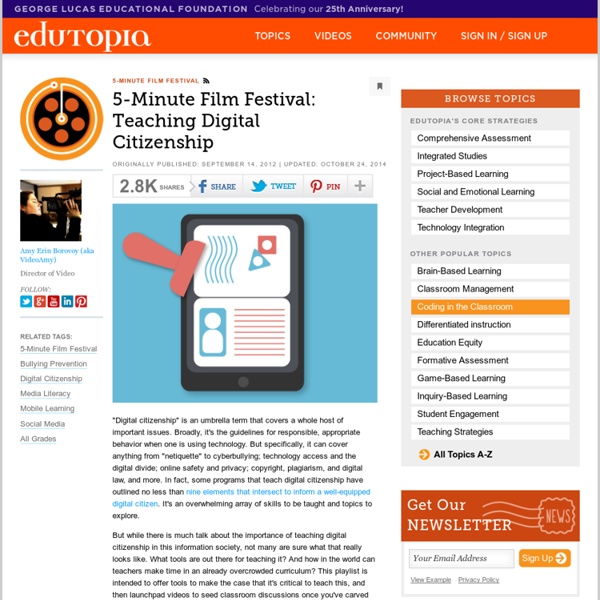Copyright & creativity for ethical digital citizens - ikeepsafe.org
The project was sponsored in part by a generous grant from the Center for Copyright Information. Click here to review the curriculum without providing your information. With Special Thanks
Online Reputation Infographic
You don't have to be running for president to care about your online reputation. Almost everything you do online is easy to track, especially when you're using social media sites. This infographic shows you how to manage your "e-reputation," perhaps saving you some embarrassment, or even your career. Gathered by digital marketing firm KBSD, it's a treasure trove of tips, techniques and information about what companies and individuals are looking for inside your personal profiles and social information, and what you can do to show off your best side to those who might want to find out unflattering things about you. It's not too late to protect yourself and polish up your online image. So now that you've grown up (you have grown up, haven't you?)
How To Make Students Better Online Researchers
I recently came across an article in Wired Magazine called “ Why Kids Can’t Search “. I’m always interested in this particular topic, because it’s something I struggle with in my middle and high school classes constantly, and I know I’m not alone in my frustrations. Getting kids to really focus on what exactly they are searching for, and then be able to further distill idea into a few key specific search terms is a skill that we must teach students, and we have to do it over and over again.
The Ocean and the Tide
I am inspired by Jade Ballek’s post on What Do Our Students Need Us to Learn? I find as a leader of professional development, I am constantly asking the teachers I work with “What do you need?” or “What do you need to learn to best support your students”? And then my own learning stems directly from that question. For example, if my teachers identify that they need to learn about effective ways to identify where students are in their understanding of multiplication and division, and how to teach from where students are, I get my research hat on, look at books and resources by key thinkers, and learn a whole TON about multiplication and division that I never thought I would ever need to know, remix it with what I already know and *Shazam* we have a learning opportunity around the topic that teachers have requested. But… what if there is something that is larger and more pervasive than those learning needs identified by the teachers I work with?
How To Teach Your Students Copyright Basics
While in school, students learn a range of things that will help them with studying in a college or university and assist them throughout their future lives. All of them are extremely important—how to express thoughts orally and in writing, how to manage time, how to collaborate with others, and many other useful things. However, often we forget that students should also know how the law works. To be precise, they need to know about copyright law, how it’s related to plagiarism, how students should work with copyrighted works and protect their own writing from copyright infringement, and even the origins of copyright laws. Below I provide you with a list of must-know copyright basics with which every student should be familiar.
Nine Elements
Nine Themes of Digital Citizenship Digital citizenship can be defined as the norms of appropriate, responsible behavior with regard to technology use. 1. Digital Access: full electronic participation in society.
How To Get Rid Of Facebook Notifications & Other Annoying Things You Don’t Want To See [Weekly Facebook Tips]
It’s funny how sometimes you can use an online service all the time, getting annoyed at little things without realising there’s an easy way to do something about it. Several of my friends who use Facebook almost every day recently told me how they hate always getting Facebook notifications for dumb games people want them to play, or updates about these games in their home feed. Obviously, if these people can be avid Facebook users without knowing there’s a fix, then there’s bound to be a few more of you out there too. As I can’t even begin to imagine the horrors of using Facebook with all those annoyances in my face, I feel I should go back to basics here and make sure everyone knows how to get rid of them.
Texas teen jailed after League of Legends argument
A Texas teenager has been jailed since March 27 over comments he made on Facebook after playing a League of Legends match. In February, an argument 18-year-old Justin Carter had with another League of Legends player spilled onto Facebook, where Carter made a comment referencing a school shooting. “Someone had said something to the effect of 'Oh you're insane, you're crazy, you're messed up in the head,’" his father Jack Carter told Texas news station KVUE.
Independent Schools Victoria
Independent Schools Victoria has negotiated licence agreements with agencies selected by the Australian Government to collect and distribute copyright fees. This means that schools do not have to seek permission each time they need to make multiple copies of copyright material for educational purposes. Material protected by copyright includes: literary works: novels, textbooks, manuals, newspapers, magazines, song lyrics, databasesartistic works: paintings, sculpture, drawings, cartoons, photographs, maps, architecturemusical works: song music, jinglesdramatic works: plays, screenplaysfilms: cinematography, videos, DVDs, televisionsound recordings: CD, DVD, vinyl, cassettes, MP3sbroadcasts: radio, television.



